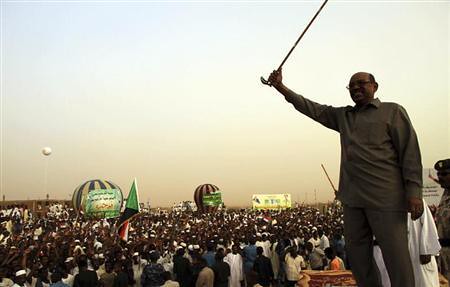
Republic of Sudan President Omar Hassan al-Bashir addressing a crowd in North Khartoum. Sudan has been a target of the United States for many years., a photo by Pan-African News Wire File Photos on Flickr.
Sudan president seeks U.S. visa for U.N. visit
Mon, Sep 16 2013
By Arshad Mohammed
WASHINGTON (Reuters) - The United States condemned on Monday the president of Sudan's application for a U.S. visa to attend a U.N. meeting next week, saying he should face charges of war crimes and genocide at the International Criminal Court.
Omar Hassan al-Bashir, accused of masterminding genocide and other crimes during a conflict in Sudan's Darfur region in which some 200,000 people were killed, has sought a visa to attend next week's opening of the U.N. General Assembly in New York.
As the United Nations' "host country," the United States has a policy of issuing visas for members of delegations, in line with a 1947 pact with the United Nations, regardless of disputes with individual countries.
While U.S. State Department spokeswoman Marie Harf declined comment on whether Bashir would get a visa - such applications are confidential under U.S. law - she and other U.S. officials made no secret of their hostility to a visit.
"Such a trip would be deplorable, cynical and hugely inappropriate," U.S. Ambassador to the United Nations Samantha Power told reporters in New York.
"It would be more appropriate for him to present himself to the ICC and travel to The Hague," she added, referring to the International Criminal Court, where Bashir face 10 charges as an "indirect" perpetrator according to the court's website.
Bashir is accused of:
- Five counts of crimes against humanity: murder, extermination, forcible transfer, torture and rape;
- Two counts of war crimes: pillaging and intentionally directing attacks against a civilian population;
- And three counts of genocide: genocide by killing, genocide by causing serious bodily or mental harm, and genocide by deliberately inflicting conditions of life calculated to bring about a target group's physical destruction.
Under the 1947 U.N. Headquarters Agreement establishing the world body's base in New York, the United States is generally expected to grant visas to officials traveling to the United Nations "without charge and as promptly as possible."
However, the United States does sometimes refuse entry to government officials and professionals from Iran with which it has had no diplomatic ties since 1980 and which it accuses of seeking nuclear weapons, a charge Tehran denies.
(Additional reporting By Susan Cornwell and by Lou Charbonneau at the United Nations; Editing by Christopher Wilson and Mohammad Zargham)
No comments:
Post a Comment